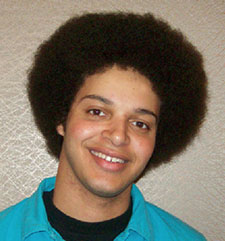A 2009 Pennsylvania College of Technology alumnus is among 10 contestants on Discovery Channel’s new competition series, “The Big Brain Theory: Pure Genius,” set to premiere at 10 p.m. on Wednesday, May 1.
Joel N. Ifill received a bachelor’s degree in welding and fabrication engineering technology from Penn College in 2009 and is a welding engineer for the Bettis Atomic Power Laboratory near Pittsburgh, where he conducts research and development for the Naval Nuclear Propulsion Program.
“I come from a rare engineering background, which gives me a great mix of engineering knowledge and practical fabrication skills that I thought would help me succeed,” Ifill said of his desire to audition for the eight-week series, which helps to celebrate American innovation.
“The series features some of the greatest young minds in America,” said host Kal Penn. “There is a lot at stake within the show itself, and in terms of what it signifies.”
 Each week, “The Big Brain Theory” will feature a seemingly impossible engineering challenge to be solved by the contestants. In the first episode, contestants must develop a solution to stop a set of explosives from detonating. And to make things even more difficult, the explosives are strapped to the back of two pickup trucks heading in a high-speed, head-on collision.
Each week, “The Big Brain Theory” will feature a seemingly impossible engineering challenge to be solved by the contestants. In the first episode, contestants must develop a solution to stop a set of explosives from detonating. And to make things even more difficult, the explosives are strapped to the back of two pickup trucks heading in a high-speed, head-on collision.
In just 30 minutes, competitors must come up with a proposed solution to complete the challenge. The expert panel of judges will then determine the two strongest engineering concepts based on logic and design. The two competitors with the best plans become captains and select a team to execute their visions in only three days.
The team that successfully completes the challenge remains safe, but the losing team will face the judges, who determine which contestant will be eliminated.
 “The whole experience was like an engineering boot camp,” Ifill said. “It was just an onslaught of tough engineering challenges that used every engineering tool I had. If I could boil it down to one thing, I learned just how much can be accomplished in a short time if you have a motivated, cohesive team, and that was a great feeling.”
“The whole experience was like an engineering boot camp,” Ifill said. “It was just an onslaught of tough engineering challenges that used every engineering tool I had. If I could boil it down to one thing, I learned just how much can be accomplished in a short time if you have a motivated, cohesive team, and that was a great feeling.”
Other challenges this season include: creating a machine that can cook and arrange a meal for a group of famished tourists near the Santa Monica Pier; building a portable bunker that can be deployed in five minutes and that is able to withstand fire, pressurized water and high-speed winds from a jet engine; and constructing a robot capable of competing in three different athletic events.
The winner of the competition will earn $50,000 and a one-year contract to work at WET, the company behind the Fountains of Bellagio in Las Vegas.
Ifill transferred to Penn College after receiving an associate degree from Washtenaw Community College in Ann Arbor, Mich.
 “Penn College appealed to me because it offered that mix of hands-on technical skills as well as engineering theory and book smarts,” he said. “I find this combination has been great in my career, as most younger engineers lack that practical knowledge of how to actually build things.”
“Penn College appealed to me because it offered that mix of hands-on technical skills as well as engineering theory and book smarts,” he said. “I find this combination has been great in my career, as most younger engineers lack that practical knowledge of how to actually build things.”
While studying at Penn College, Ifill worked at SPX Thermal Product Solutions in White Deer, and upon graduation he took a job in California where he welded rocket motors. In 2010, he moved back to Pennsylvania to work with the Bettis Atomic Power Laboratory.
“I am one of the few engineers who can say that I have worked on projects that are in outer space (satellite rocket engines) and underwater (submarines),” he said.
Judges for “The Big Brain Theory” are Mark Fuller, inventor and president/CEO of WET, and Christine Gulbranson, a nanotechnology and renewable energy innovator. There will also be several guest judges appearing throughout the season, including astronaut Buzz Aldrin, NASCAR champion Carl Edwards and Olympic gold medalist Bryan Clay.
 “I hope the public learns what welding engineers are, and that you can be very intelligent and passionate about the skilled trades and go far in those industries,” Ifill said. “If I could give one message to the kids and next generation, it would be confirmation that you can look like me, be a minority in both race and job title, and still thrive and excel in the field of engineering!”
“I hope the public learns what welding engineers are, and that you can be very intelligent and passionate about the skilled trades and go far in those industries,” Ifill said. “If I could give one message to the kids and next generation, it would be confirmation that you can look like me, be a minority in both race and job title, and still thrive and excel in the field of engineering!”
To learn more about the show and watch a trailer, visit Discovery Channel.
To learn more about welding and fabrication engineering technology and other academic programs offered by the School of Industrial and Engineering Technologies at Penn College, call 570-327-4520.
For general information about the college, email the Admissions Office or call toll-free 800-367-9222.
Joel N. Ifill received a bachelor’s degree in welding and fabrication engineering technology from Penn College in 2009 and is a welding engineer for the Bettis Atomic Power Laboratory near Pittsburgh, where he conducts research and development for the Naval Nuclear Propulsion Program.
“I come from a rare engineering background, which gives me a great mix of engineering knowledge and practical fabrication skills that I thought would help me succeed,” Ifill said of his desire to audition for the eight-week series, which helps to celebrate American innovation.
“The series features some of the greatest young minds in America,” said host Kal Penn. “There is a lot at stake within the show itself, and in terms of what it signifies.”
 Each week, “The Big Brain Theory” will feature a seemingly impossible engineering challenge to be solved by the contestants. In the first episode, contestants must develop a solution to stop a set of explosives from detonating. And to make things even more difficult, the explosives are strapped to the back of two pickup trucks heading in a high-speed, head-on collision.
Each week, “The Big Brain Theory” will feature a seemingly impossible engineering challenge to be solved by the contestants. In the first episode, contestants must develop a solution to stop a set of explosives from detonating. And to make things even more difficult, the explosives are strapped to the back of two pickup trucks heading in a high-speed, head-on collision.In just 30 minutes, competitors must come up with a proposed solution to complete the challenge. The expert panel of judges will then determine the two strongest engineering concepts based on logic and design. The two competitors with the best plans become captains and select a team to execute their visions in only three days.
The team that successfully completes the challenge remains safe, but the losing team will face the judges, who determine which contestant will be eliminated.
 “The whole experience was like an engineering boot camp,” Ifill said. “It was just an onslaught of tough engineering challenges that used every engineering tool I had. If I could boil it down to one thing, I learned just how much can be accomplished in a short time if you have a motivated, cohesive team, and that was a great feeling.”
“The whole experience was like an engineering boot camp,” Ifill said. “It was just an onslaught of tough engineering challenges that used every engineering tool I had. If I could boil it down to one thing, I learned just how much can be accomplished in a short time if you have a motivated, cohesive team, and that was a great feeling.”Other challenges this season include: creating a machine that can cook and arrange a meal for a group of famished tourists near the Santa Monica Pier; building a portable bunker that can be deployed in five minutes and that is able to withstand fire, pressurized water and high-speed winds from a jet engine; and constructing a robot capable of competing in three different athletic events.
The winner of the competition will earn $50,000 and a one-year contract to work at WET, the company behind the Fountains of Bellagio in Las Vegas.
Ifill transferred to Penn College after receiving an associate degree from Washtenaw Community College in Ann Arbor, Mich.
 “Penn College appealed to me because it offered that mix of hands-on technical skills as well as engineering theory and book smarts,” he said. “I find this combination has been great in my career, as most younger engineers lack that practical knowledge of how to actually build things.”
“Penn College appealed to me because it offered that mix of hands-on technical skills as well as engineering theory and book smarts,” he said. “I find this combination has been great in my career, as most younger engineers lack that practical knowledge of how to actually build things.”While studying at Penn College, Ifill worked at SPX Thermal Product Solutions in White Deer, and upon graduation he took a job in California where he welded rocket motors. In 2010, he moved back to Pennsylvania to work with the Bettis Atomic Power Laboratory.
“I am one of the few engineers who can say that I have worked on projects that are in outer space (satellite rocket engines) and underwater (submarines),” he said.
Judges for “The Big Brain Theory” are Mark Fuller, inventor and president/CEO of WET, and Christine Gulbranson, a nanotechnology and renewable energy innovator. There will also be several guest judges appearing throughout the season, including astronaut Buzz Aldrin, NASCAR champion Carl Edwards and Olympic gold medalist Bryan Clay.
 “I hope the public learns what welding engineers are, and that you can be very intelligent and passionate about the skilled trades and go far in those industries,” Ifill said. “If I could give one message to the kids and next generation, it would be confirmation that you can look like me, be a minority in both race and job title, and still thrive and excel in the field of engineering!”
“I hope the public learns what welding engineers are, and that you can be very intelligent and passionate about the skilled trades and go far in those industries,” Ifill said. “If I could give one message to the kids and next generation, it would be confirmation that you can look like me, be a minority in both race and job title, and still thrive and excel in the field of engineering!”To learn more about the show and watch a trailer, visit Discovery Channel.
To learn more about welding and fabrication engineering technology and other academic programs offered by the School of Industrial and Engineering Technologies at Penn College, call 570-327-4520.
For general information about the college, email the Admissions Office or call toll-free 800-367-9222.
